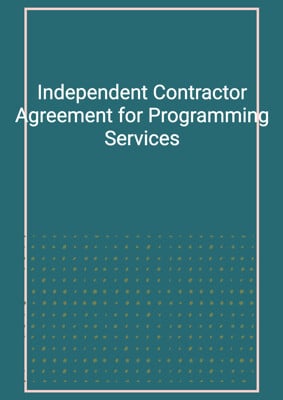How to Tailor the Document for Your Need?
01
Create Document
Fill in the details of the parties. You can click the "Fill with Member’s Information" button to complete it with information saved to your account.
02
Fill Information
Please fill in any additional information by following the step-by-step guide on the left hand side of the preview document and click the "Next" button.
03
Get Document
When you are done, click the "Get Document" button and you can download the document in Word or PDF format.
04
Review Document
Please get all parties to review the document carefully and make any final modifications to ensure that the details are correct before signing the document.
Document Preview
Document Description
In today’s rapidly evolving business landscape, many companies are hiring independent contractors as a flexible and cost-effective solution. Apart from working on a project-by-project basis, many firms also hire long-term independent contractors to save on the overhead costs associated with traditional full-time employees.
An independent contractor agreement is a legally binding document that establishes the terms of the working relationship between a company and an independent contractor. This agreement is crucial in defining the roles, responsibilities, and expectations of both parties, ensuring a clear understanding and avoiding potential conflicts.
An independent contractor agreement typically includes the following key elements:
- Scope of Services: Detailed description of the tasks and responsibilities the contractor is expected to perform.
- Payment Terms: Information on how and when the contractor will be compensated, which could be based on an hourly rate, a flat fee, or a milestone-based structure.
- Duration and Termination: The start and end dates of the contract, as well as conditions under which either party can terminate the agreement.
- Confidentiality: Clauses to protect sensitive information shared during the course of the contract.
- Intellectual Property: Terms outlining the ownership of any intellectual property created during the engagement.
- Independent Contractor Status: Clarification that the contractor is not an employee and therefore not entitled to employee benefits.
- Miscellaneous Provisions: Other terms such as dispute resolution, indemnification, and governing law.
An independent contractor agreement is essential for several reasons:
- Clarity and Expectations: It provides a clear framework for the relationship, specifying what is expected from each party.
- Legal Protection: It protects both the company and the contractor by outlining their rights and obligations, thus minimizing the risk of legal disputes.
- Financial Planning: It ensures transparent and agreed-upon payment terms, aiding in financial planning and budgeting.
- Regulatory Compliance: It helps in distinguishing between an employee and a contractor, which is crucial for compliance with tax laws and labor regulations.
For small businesses, an independent contractor agreement is particularly important for several reasons:
- Risk Management: By clearly defining the contractor’s status, it helps avoid misclassification issues that could lead to legal penalties.
- Cost Control: It allows small businesses to manage costs effectively by agreeing on flexible payment structures without the burden of full-time employee benefits and liabilities.
- Intellectual Property Protection: It ensures that any intellectual property created during the contract is owned by the business, protecting its assets and competitive edge.
- Confidentiality Assurance: It safeguards the business’s sensitive information through confidentiality clauses, which is vital for maintaining competitive advantage.
In conclusion, an independent contractor agreement is a foundational document that not only facilitates a smooth working relationship but also provides essential protections and clarity, making it an indispensable tool for small businesses operating in today’s dynamic market environment.
How to use this Document?
1. Start by reviewing the agreement's date and the names of the parties involved.
2. Take note of the contractor's duties outlined in Section 1.
3. Understand that the contractor is not considered an employee as set out in Section 2.
4. Take note of the period of the Services (Section 3) and the payment terms (Section 4).
5. Read through the warranties section (Section 5), which details the contractor's obligations to secure necessary licenses, and ensure the work product is free from infringement and proprietary rights violations.
6. Read through Sections 6 and 7 to acknowledge the scope of limitation of Liability of the Contractor and that there is no indemnification provided by the Company.
7. Review the termination clauses in section 8.
8. Check Section 9, which prohibits the contractor from assigning or sub-contracting the service's performance without the company's written consent.
8. Review the conflict of interest and non-solicitation section (Section 10), which prohibits the contractor from becoming a party to any agreement that would impede or prohibit the proper execution of this agreement and from soliciting any of the company's clients.
9. Note that any modifications to the agreement must be made in writing and agreed upon by both parties (Section 11).
10. Ensure that both parties sign the agreement and that each party receives a copy.
Not the right document?
Don’t worry, we have thousands of documents for you to choose from:












































